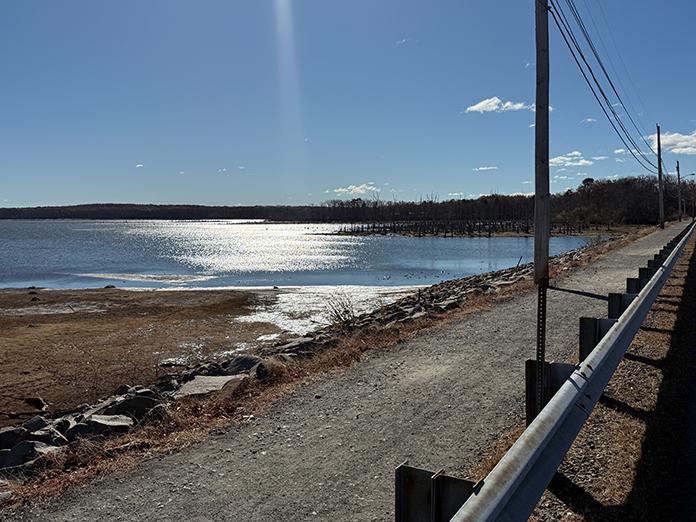BERKELEY – The Greek myths mean something today just as they did thousands of years ago. They last forever, which is why people will never stop telling their stories. And why Charles and Vlas Parlapanides – originally from Seaside Park – have continued their stories with Blood of Zeus seasons 2 and 3.
Charles Parlapanides took some time from his busy schedule to talk to The Berkeley Times about Season 2 and the creative process (spoilers ahead if you haven’t watched Season 1).
The first season of “Blood of Zeus” debuted in 2020 on Netflix and had an overwhelmingly positive response.
“That was really nice to see,” Parlapanides said. “I’m proud that people responded to the show.”
Season 2 just dropped on Netflix and Season 3 will be sometime next year.
Hades brings Seraphim under his wing. (Image courtesy Netflix)
Starting up at the start of Season 2, Zeus is gone and there’s a power vacuum on Mt. Olympus. Heron, the main character, is at a crossroads. Being a son of a god and a mortal, he doesn’t feel like he belongs in either world.
Hades, god of the underworld, becomes an even more prominent player.
“Vlas and I always said he can’t be a villain,” Charles Parlapanides said. He is only able to see his wife, Persephone, part of the year. While the original Greek myth paints this picture as Hades capturing her, the “Blood of Zeus” canon sees him as a tragic character, and Persephone as his equal in the Underworld. The role they play in the fate of Seraphim is yet to be revealed.
As for the third season, he’s not giving anything away just yet.
In the age of streaming, it’s a little different in how you gauge success. Netflix, for example, measures how many screens are watching a program for more than the first 90 seconds.
With the short attention span that people have today, you have to grab an audience right away. People are used to opening on action. Extremely approachable settings. Characters you already know. Quick edits. Tiktok vids.
Heron finds that there is much at stake in the matters of gods and titans. (Image courtesy Netflix)
So the challenge becomes how do you engage with an audience quickly while also giving them something that they’ll think about long after the episode is over, he said. “It’s changed the way we tell stories.”
He worries that modern viewers might never sit long enough for a film like “Lawrence of Arabia,” a classic by any standard, which clocked in at 3 hours, 42 minutes.
Fortunately, Netflix encourages characters going on a journey, changing over the course of a season. And they appreciate characters in conflict and the dynamic that comes from that, he said.
A series “gives more time and more room to really tell your stories,” he said.
No matter the medium, whether its books, movies or television – what keeps you engaged is “What is the relationship and the story hook?”
While there is still a place for stories where uncomplicated good guys triumph over obviously evil bad guys, this is not one of those stories. It’s not heroes versus villains, its protagonists versus antagonists.
The protagonist is not so heroic or perfect, but the creators hope you are rooting for them.
Hades and Persephone might not be what viewers expect of these mythological beings. (Image courtesy Netflix)
He used the films of Chrisopher Nolan as an example. There are three or four points of view and you can see why they feel the way they do. Then, over the course of the story, they are drawn together and that becomes the conflict and the drama.
People wanting to get into the film business should get involved in all aspects, he said. Knowing how to write will teach you things about directing. Knowing how to edit will teach you about cinematography. All of the aspects are interwoven.
The acclaimed filmmaker Akira Kurosawa said that writing scripts helped teach directing scripts. Similarly, knowing where to point the camera tells you what the scene is about, he said.
Writing is one aspect that stands apart from the others, said the writer. “You don’t need anyone’s permission to do it.”
Athena and her owl are ever watchful. (Image courtesy Netflix)
While filmmaking is collaborative – involving several people on the independent level, to several hundred in the big studios – writing can be solitary or with a partner. The other strength, he said, is that your calling card is the written page.
“If (a producer) reads something that’s good, they don’t care who you are or where you’re from,” he said.
There might be more filmmakers coming from this area. Netflix will be building studios on 289 acres of the former Fort Monmouth property.
“Netflix is the biggest game in town,” he said. “I love that they have a foothold in New Jersey. It’s going to be good for the local economy. It will help production in New Jersey and New York – especially the Jersey shore.”
The post From Jersey Shore To Ancient Greece: “Blood Of Zeus” Returns appeared first on Jersey Shore Online.


